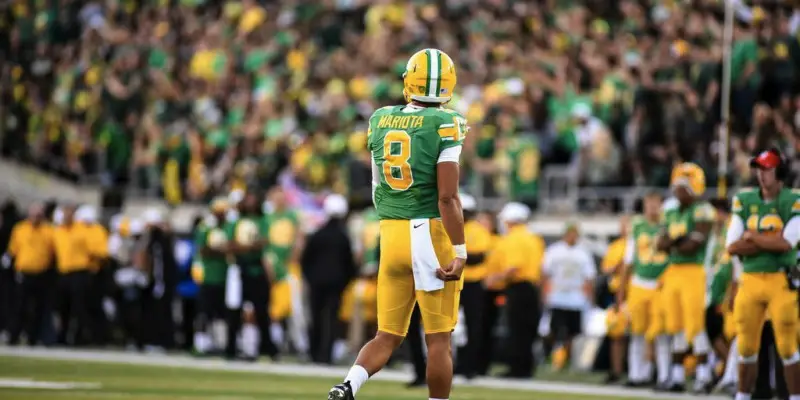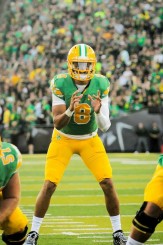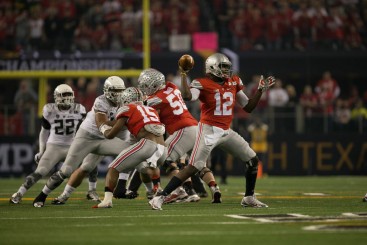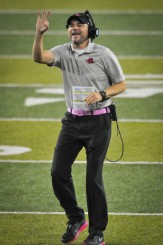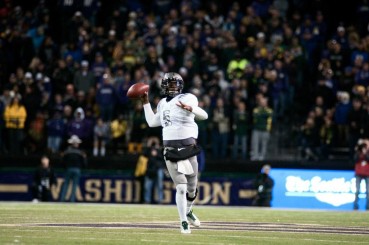For a quarterback, the leap from high school or junior college to a major college football program is significant, and those veterans who have had two or three years in their offensive systems certainly benefit from their experience, while rookies may struggle to find footing early on. However, recent trends indicate that brand-new quarterbacks have enjoyed more success than their seasoned counterparts.
Before Tim Tebow’s exceptional 2007 campaign, no underclassmen had ever won a Heisman Trophy. Since then, six quarterbacks have taken home the statue. Of those six, three were underclassmen and three were first-year starters.
Over the last five seasons, seven of the ten teams that played for a national title had a first-year starter under center, including four of the five eventual champions.
There are exceptions to this rising trend, of course. Perhaps the best example is Oregon’s own Marcus Mariota. The three-year starter seemed to steadily improve his game each year, and eventually took home the Heisman Trophy last December. Aaron Murray, A.J. McCarron, Bo Wallace, and Trevone Boykin are other examples of recent quarterbacks who have benefited from experience.
This linear progression is becoming less common. After their respective Heisman campaigns in 2012 and 2013, Johnny Manziel and Jameis Winston both seemed to take a step back the following year. Manziel’s issues were largely due to increased off-the-field attention and Winston struggled in terms of turnovers and decision-making in the pocket.
So, why are inexperienced quarterbacks finding increased success in college football? A big part of it is the element of surprise.
Heading into 2014, Alabama would not have been considered by most to have a very explosive offense, having made a name for itself as an inside running force. Enter Blake Sims, who finally got the starting nod in his final year of eligibility.
Sims’ running ability made it more difficult to formulate a game plan against the Tide, and he completely opened up the offense. No one knew exactly what to expect of him or the offensive system as a whole, and his versatility gave defenses headaches all season.
This also held true for Mariota, Manziel, and Winston as freshmen. It did not take long for these studs to take advantage of the element of surprise and use their unique skill sets to dominate elite competition.
This argument could also account for players who decline after their first year as well. Think about Denard Robinson. In 2010, every team that Michigan faced was left stunned because of Robinson’s electric dual-threat abilities. However, by his senior year, defenses were better prepared for “Shoelace,” and he began to lose snaps at quarterback to Devin Gardner.
Perhaps the most impressive element of the recent success of new quarterbacks is intangible. Despite the inherent pressure, these quarterbacks showcase remarkable mental strength, playing loose with confidence and poise.
Cardale Jones, who represents the trend of new starters’ success better than any other player, showcased these intangible qualities for Ohio State at the end of last season. One does not exactly expect a quarterback who has never started a game to start taking deep shots down the field because there is an assumed level of anxiety or nerves.
However, Jones had four touchdown passes from at least 30 yards out in his first two starts against Wisconsin and Alabama, winning both games. He ultimately went on to defeat Oregon in the inaugural College Football Playoff Championship Game.
The most effective and successful offensive systems of late have boasted the ability to find gems that slipped through the cracks on the recruiting trail and succeed without traditional talent. Oregon, Baylor, and Texas A&M stand out in their ability to “plug-and-play,” with quarterbacks such as Mariota, Manziel, and Bryce Petty standing as recent examples of quarterbacks finding success as first-year starters.
Much of this success is due to the brilliance of the offensive schemes. Oregon is perhaps the best example of this. Former head coach Chip Kelly, current head coach Mark Helfrich, and offensive coordinator Scott Frost have helped put together a dominant, innovative system using speed, versatility, and options to keep defenses guessing.
But an even bigger part of this success stems from the ability to find the right players to run these offenses. Mariota eventually proved to be one of the biggest recruiting sleepers of the last decade largely because he started at quarterback for only one year in high school.
Still, Kelly and Helfrich seemed to love him as soon as they saw him because he had the right qualities for their system. He was fast, tall, and accurate, but more importantly, he was poised beyond his years. All of these traits shone through when he took the field as a freshman and led the Ducks to a brilliant 12-1 record in 2012.
With Mariota heading to the NFL, many will question how the Ducks will fare in 2015. However, it is important to keep in mind that Darron Thomas and Mariota were the last two quarterbacks to play for Oregon, and they only lost a combined two games in their first years starting under center.
The trend of first-year quarterback success is clear on a national scale, and Oregon is one of the best examples. Eastern Washington transfer Vernon Adams is considered by many to be the favorite as Mariota’s successor at quarterback.
Adams posted video game numbers over the past three seasons, throwing for over 10,000 yards and 110 touchdowns. It will be a big leap for him in terms of the competition he will be facing in 2015, but he fared just fine against Pac-12 opponents at Eastern Washington, defeating Oregon State in 2013 and throwing seven touchdowns against Washington in 2014.
Helfrich has a great track record of finding the right pieces for his scheme, and while the departure of Mariota hurts in many ways, recent history shows that the Ducks may not miss a beat in 2015.
Top Photo by Craig Strobeck
Joey Holland graduated from the University of Oregon in 2013, majoring in History. He played several sports in high school, though football remains his passion. He has yet to miss a single Oregon Ducks home football game during his time in Eugene. Joey has written previously for Bleacher Report and Football Nation.
Joey welcomes your feedback.

